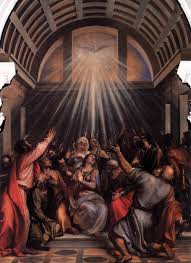Holy Ghost, Descend Upon Your Children
A couple of months back, I made the decision to drop CCLI. Perhaps I will return. You can read about why here.
That said, tonight I will play for a charismatic healing mass in my archdiocese. What songs to pick? I found a nice combination of classic hymns, Latin communion songs, and author-unattributed praise choruses that I think all three will flow nicely together.
But I as I was preparing for this, I was also preparing for an upcoming worship podcast for the Feast of Pentecost, one of my favorite Holy Days on the Church calendar. Charismatics of all denominational persuasions love this day, as the readings commemorate the happenings that occurred in the Book of Acts, chapter 2.
So in doing my searches for new (to me) public domain hymns for the feast of Pentecost (or Whit-Sunday, as it was once called), I came across this hymn:
Holy Ghost, come down upon Thy children,
Give us grace and make us Thine;
Thy tender fires within us kindle,
Blessèd Spirit, Dove divine.
1. For all within us good and holy
Is from Thee, Thy precious gift;
In all our joys, in all our sorrows,
Wistful hearts to Thee we lift.
2. For Thou to us art more than Father,
More than sister, in Thy love,
So gentle, patient, and forbearing,
Holy Spirit, heavenly Dove.
3. O we have grieved Thee, gracious Spirit!
Wayward, wanton, cold are we;
And still our sins, new every morning,
Never yet have wearied Thee.
4. Now if our hearts do not deceive us
We would take Thee for our Lord
O dearest Spirit! Make us faithful
To Thy least and lightest word.
Now this was written in 1860 by Frederick Faber, who was a Catholic convert and ordained priest.
Here’s what intrigues me about this hymn: modernize the thees and thys, update a couple of words, and this could have been written yesterday. The music is very simple, very childlike to play, but the chord progressions leading to this are a little bit more complicated than one would expect (not hard, just slightly different). Melodically, it is a home run. And lyrically, it is extremely powerful.
What I don’t quite understand is why this hymn was dropped from our hymnals. Hymnary, which keeps a running tally of hymns usage over the years, states that this was pulled out of Catholic hymnals in the mid-1950s.
And in 1967, the beginnings of the charismatic renewal were introduced to some twenty Catholic students at Duquesne University.
Were these students ever familiar with this hymn, as little children? Were they ever introduced to it? Did they ever sing it? Was it merely forgotten?
Furthermore, how did Frederick Faber know that it was okay to pray for the Holy Spirit to come down upon us, His children? How could this nineteenth century hymn-writer be so knowledgeable about the power of the Holy Spirit, nearly a century before the charismatic renewal re-introduced this to the church?
What do you think?
Note: I will be introducing a slightly altered version of this hymn in an upcoming episode of the Prayer Meeting Podcast, where some Thees and Thys will be properly modernized, as well as adding a third melody line for one of the verses. I will be providing a means for which I could share the music notation for those who are interested.










Nick, I see there are a few different tunes to which the text has been set. Which is your preferred tune? Also, your page title is “Holy Ghost, Descend Upon Your Children.” Are you going to change “come down” to “descend?” I look forward to your rendition. Good find.
The tune I prefer is called “Paraclete”, which I believe became the standard tune after the first couple of trial runs. What I like about this melody is that it’s not really in a major or minor key, but in a dominant key, which means that while it’s in the key of G, it plays like it’s the key of D. That gives it a very worshipful tone, and somewhat childlike too.
I decided to change the title to Descend because it is a cleaner word than “come down.” It rolls off the tongue better. A couple of the phrases therein will be slightly modified to make sense to modern ears, and the third verse will have a melody slightly different than the rest. Can’t wait to share this in a week or two.
Sounds good!
Frederick Faber could write so convincingly about the mystical life because the Holy Spirit never left the church…the Charismatic Renewal was an unusually large manifestation of the Spirit on a group of laypersons, but saints’ writings often contain this kind of sentiment.
Catholic hymns from the 19th century are often very full of emotion (“Jesus, I swoon for thee…”). They were devotional works not intended for liturgical use. At this stage in history we don’t have hymns at Mass but we have sodalities, rosaries, and devotional gatherings where singing this kind of song was perfectly appropriate. Many 20th century church musicians worked hard to get this kind of song *removed* from hymnals in the pews.
Faber is also the author of “Faith of Our Fathers,” which longs for glorious martyrdom. Faber seems to have been a rather emotional fellow, and one biographer of Newman suggests that the more famous Oratorian found him frustrating to deal with.
Thank you for your historical insight. We can agree to disagree as to whether more of Faber’s writings ought to be reinstated into hymnals or not, but my main gist is that Faber’s Pentecostal hymns very well could have been part of the Charismatic Renewal’s general music syllabus.